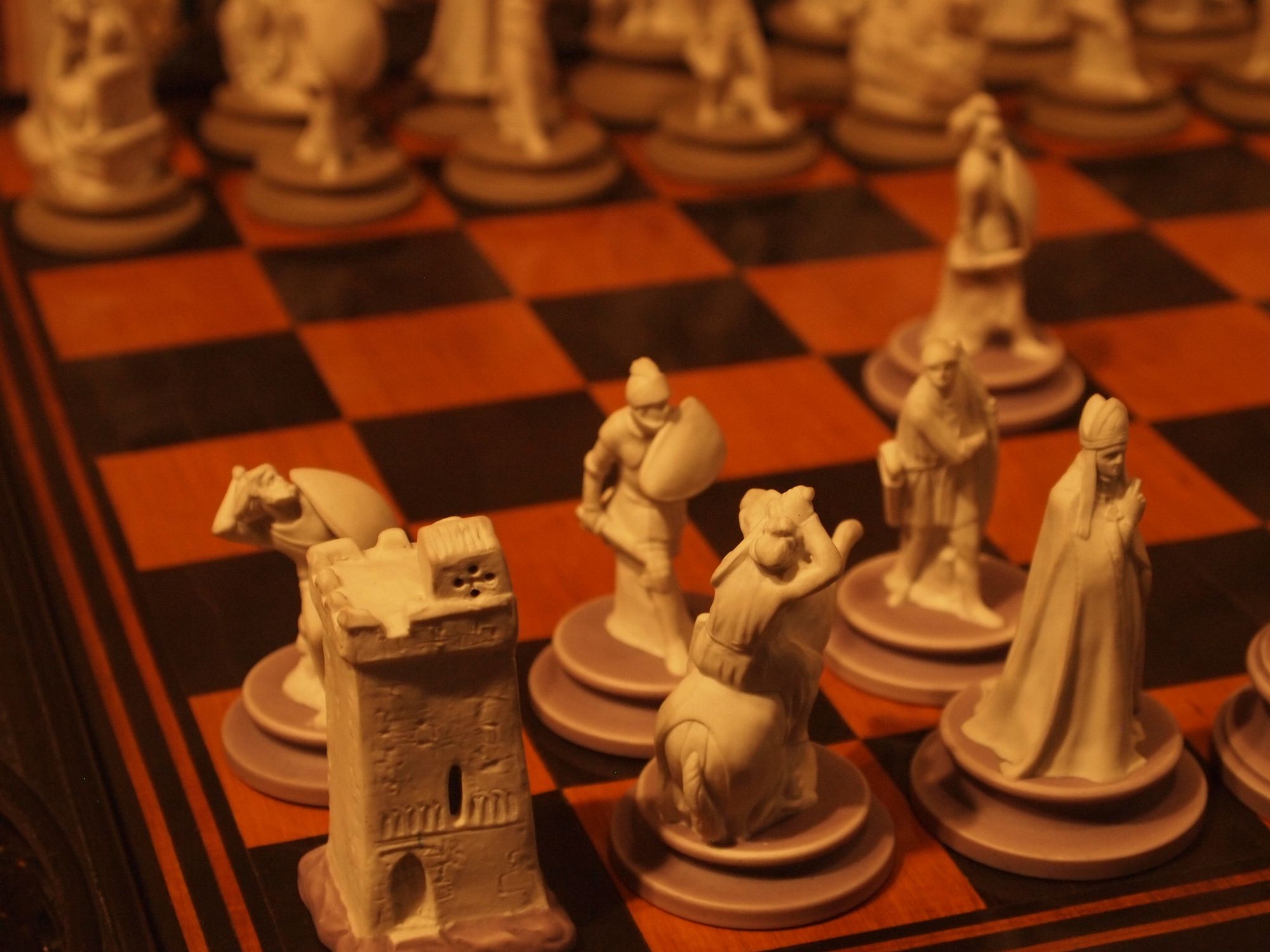Few sports expose the hypocrisy behind gender segregation in sports and games than chess. Gender segregation in sports is a persistent, pernicious, and damaging problem to grapple with, largely because the people who are most invested keeping women separate (and profoundly unequal) in sporting competition aren't particularly interested in an honest, evidence-driven discussion about what does and does not work about that arrangement.
The arguments centered on observed physiological differences between cisgender men and cisgender women are flawed to begin with. Yet the more common arguments against the value of women in sports and gender parity are typically more base -- a blind adherence to "tradition," or aesthetics, or simply rank and unqualified sexism.
With chess, billed as a "sport of the mind," the old arguments about physiological differences that supposedly make it impossible for men and women to compete on equitable terms should fall away. And indeed, this was part of the rationale for the decision to finally open chess competitions up to women on the international level roughly 30 years ago. Women still have their own tournament circuits and their own separate rating systems and their own titles, but female competitors have the choice to throw down with men. Hungarian grandmaster Judit Polgár famously refused to compete in women's tournaments or claim women's titles, saying that "... women should have the self-confidence that they are as good as male players, but only if they are willing to work and take it seriously as much as male players."
And yet, somehow, women are still being systematically held down and excluded from the highest levels of the game.
One need only look at the current Candidates Tournament being held this month in Berlin. Eight of the strongest players in the world are vying for the right to challenge reigning champion Magnus Carlsen for the World Championship in November in London. All eight are men.
Indeed, if you look back through the history of the World Championship, you'll note that women are conspicuously absent from the conversation. Only one woman has ever come close to challenging for the world title -- Polgár, who competed for the FIDE World Championship in 2005 but posted a disappointing performance and finished last out of eight. (Veselin Topalov went on to win, and the next year the two major world chess championship titles were unified in an historic clash between Topalov and Vladimir Kramnik, who is currently competing in Berlin to regain his title.)
To get to the World Championship involves playing and winning in other, smaller tournaments -- but these tournaments are often invitationals. Surprise, surprise: women don't seem to get invited.
In some sense, opening competitive chess to allow men and women to compete together has served to hold women back. The people who were most committed to keeping women out did not lose any political power when the gender barrier was broken, and now they can claim a degree of plausible deniability when inequality rears its head.
Take, for example, the 2017 Gibraltar Chess Festival, which featured some of the strongest players in the world in their Masters division. Among this elite class of competition was Hou Yifan, a former child prodigy and a previous World Women's Champion. She had recently decided to leave the women's competition circuit, in part to be able to compete on equal terms with the men. But at Gibraltar, the software that handles competitor pairing somehow managed to schedule her against other women in seven of the first nine rounds. In her tenth and final game of the tournament (for which she was half an hour late), Yifan appeared to throw the match in protest by playing an unusual opening and resigning after five moves.
In that game, Yifan played White against Indian grandmaster Babu Lalith (who she outranked at the time of the match). Here's how the game went down:
For those of you who don't know the ins and outs of chess, Yifan's opening sequence of 1.g4 and 2.f3 is an invitation for her opponent to make a Fool's Mate, a sequence in which Black can deliver checkmate in just two moves. Had Lalith opened with 1. ...e5 instead of 1. ...d5, he would've been able to do just that with 2. ...Qh4#. The Fool's Mate is one of the first things you learn about when you pick up the game. Simply put, there's no way Yifan would have played this opening sequence unless it was on purpose.
Yifan confirmed this later in her comments to the press: "I just hoped that attention could be coming to the final decisive round. And what I also hope [is] that the pairings -- you know -- for the future event should be like a 100 percent fair situation."
Not that anyone listened to her. The tournament directors insisted the pairings were coincidental and handled entirely by software. Pundits tried to say that she cracked under pressure, or that she's just not committed enough to the game because she has a life outside of chess, or that she simply can't hack it at this level of the game. A few, like British grandmaster Nigel Short, obliquely accused her of poor sportsmanship.
Short, incidentally, has some fascinating opinions on women in the sport. Namely that "girls just don't have the brains to play chess." When Polgár called bullshit on his comments, Short did what all thin-skinned sexists do: claimed that he's a victim of a pitchfork-wielding mob.
Short is far from alone in his opinions on women chess players. The famous American wunderkind Bobby Fischer said this about women in the game:
"They're all weak, all women. They're stupid compared to men. They shouldn't play chess, you know. They're like beginners. They lose every single game against a man. There isn't a woman player in the world I can't give knight-odds to and still beat."
When men who are committed to this narrative aren't giving impassioned and overtly sexist arguments, they try to justify their position by pointing to the lack of competitors at the highest levels in the game. They also point to the fact that on average, women chess players have both national and FIDE ratings 8% lower than men.
But these ratings are a self-fulfilling prophecy. The few women who have broken into in the world Top 100 ratings comes down to participation rates. Vastly fewer women play chess overall, which means there are fewer women in elite competition. The average ratings discrepancy is real, but these ratings also draw on vastly different sample sizes. Research continues to bear this out. Lower participation rates are largely down to cultural factors. Most importantly, these problems don't just persist at the elite levels -- local chess clubs and scholastic competitions also suffer from a gender gap. If women and girls are not getting involved in chess at amateur and scholastic levels, it's extremely unlikely that they will begin to participate at higher levels.
But regressive attitudes toward women persist in the culture of chess, and so lower participation rates and lower overall competitive performances are explained as women just not being very good at it. You know, because of their inferior lady-brains.
Yeah, that must be it.
As an aside, there is very, very little information about transgender and nonbinary people in the chess world. A Google search for "transgender chess player" turns up two top results: a woman who lost her job at the St. Louis Chess Club after she began her transition, and a forum thread in which a user muses on whether he can lie to FIDE and say he's a transgender woman so that he can earn a women's grandmaster title. Suffice it to say, trans and queer representation in the game has a long way to go.
And now, here we are. The next World Champion in chess will be a man -- either Magnus Carlsen or one of the eight potential challengers currently duking it out in Berlin. Despite elite competitions being open to all genders on paper, women still face steep systemic and cultural barriers. And in the absence of any meaningful physiological distinctions that typically justify gender segregation in sports, those who are committed to keeping women in separate (and inferior) classes fall back on the position that women are plainly less intelligent than men. And, due to the insular world they have created for themselves within elite chess, they are rarely called out on it.
We need to have serious and meaningful conversations about the utility of gender segregation in sports. Part of that conversation has to include how so many arguments in favor of keeping men and women separate are actually made in bad faith, and how those bad-faith arguments persistently cast women as well as trans, nonbinary, and intersex participants as inferior or aberrant to the benefit of men. The persistent gender gap in chess, founded on weak evidence but continuously upheld nonetheless, should serve as a useful opening for that line of attack.
(Photo: Leo Gonzales/Flickr)



